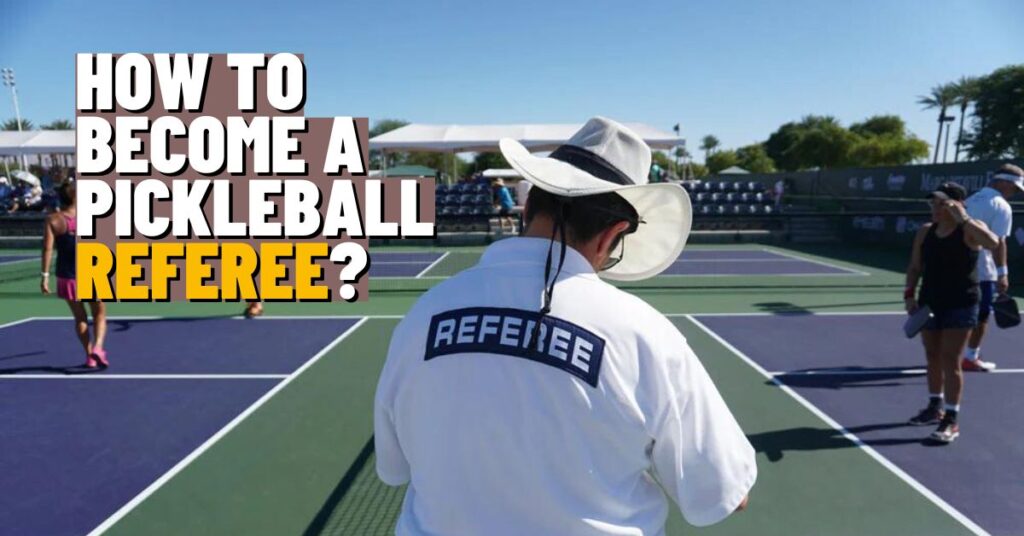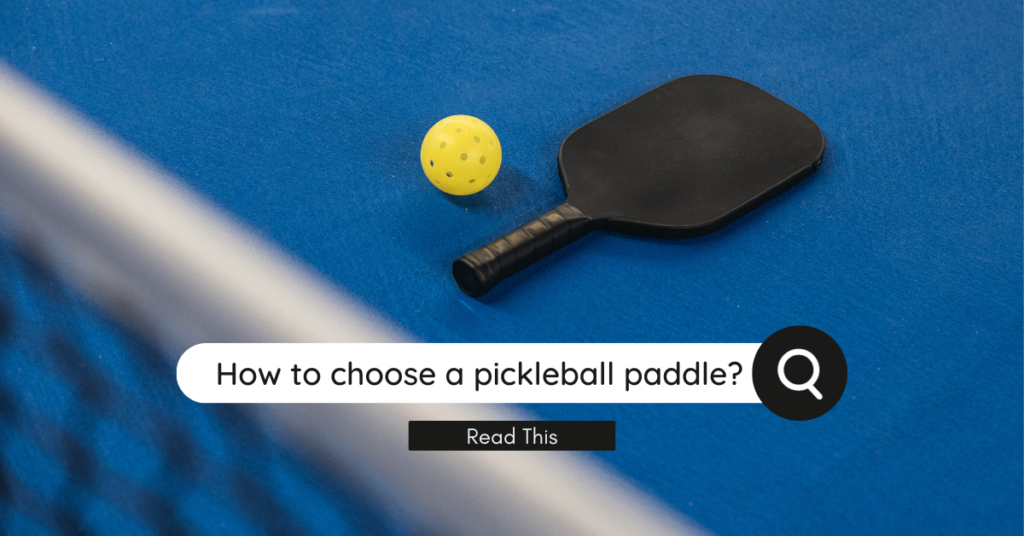Wanna be a pickleball referee? Okay then sit back and read this carefully, we are going to explore all the way how you can become a pickleball referee!
To become a pickleball referee, you need to complete a certification program and gain practical experience in officiating matches. This involves learning the rules of the game, attending referee clinics, and taking an online test.
Once certified, you can officiate pickleball matches at different levels, including local tournaments and national championships. Pickleball is a fast-growing sport that combines elements of tennis, badminton, and table tennis. As the popularity of the game continues to rise, the demand for qualified referees also increases.
If you have a passion for pickleball and a desire to contribute to the sport, becoming a referee can be a rewarding experience. We will outline the steps you need to take to become a pickleball referee. From training and certification to gaining practical experience and advancing your officiating career, we will cover everything you need to know to get started. So, let’s dive in and explore the exciting world of pickleball officiating.
Understanding The Basics Of Pickleball Refereeing
Understanding the basics of pickleball refereeing is essential for anyone interested in becoming a pickleball referee. As a referee, you play a crucial role in ensuring fair play and maintaining the integrity of the game. This section will provide an overview of the important aspects you should grasp to excel in this position.
The Role Of A Pickleball Referee
The role of a pickleball referee is to preside over matches and enforce the rules of the game. Referees play a vital role in maintaining the overall flow and fairness of the game, ensuring a level playing field for all participants. They are responsible for interpreting and applying the rules in real-time, making important decisions that impact the outcome of the game.
Key Responsibilities In Pickleball Officiating
Being a pickleball referee involves several key responsibilities. It is the referee’s duty to:
- Ensure that players adhere to the rules and regulations of pickleball.
- Maintain a safe and controlled environment for the players, addressing any safety concerns that may arise during the match.
- Follow proper signaling and communication techniques to indicate scoring, faults, and violations to the players and spectators.
- Make quick and accurate decisions, often under pressure, to resolve any conflicts or disputes that may arise during the game.
Importance Of Fairness And Impartiality In Refereeing
Fairness and impartiality are essential qualities for any pickleball referee. As a referee, you must strive to be unbiased and make decisions solely based on the rules, regardless of personal preferences or external factors. Your primary goal should be to maintain fairness throughout the match and ensure that both teams have an equal opportunity to succeed.
In conclusion, understanding the basics of pickleball refereeing is crucial for anyone aspiring to become a referee. By comprehending the role, responsibilities, and importance of impartiality, you are well on your way to becoming a knowledgeable and respected pickleball referee.
Familiarizing Yourself With The Official Rulebook
To become a competent and knowledgeable pickleball referee, one of the first steps is to familiarize yourself with the official rulebook. The rulebook serves as your guide and reference for all the regulations and guidelines that govern the sport of pickleball. By understanding and internalizing these rules, you will be able to officiate matches effectively and make accurate decisions on the court.
Acquainting Yourself With The Usapa Rulebook
The USAPA, or the United States of America Pickleball Association, is the governing body for the sport of pickleball in the United States. The USAPA Rulebook is considered the official rulebook for the sport and is widely recognized worldwide. It provides a comprehensive guide on how the game should be played, the equipment specifications, as well as the various infractions and penalties that can occur during a match. It is essential to immerse yourself in the USAPA Rulebook to ensure you have a solid foundation of knowledge before stepping onto the court as a referee.
Decoding The Terminology And Language Used In The Rulebook
The rulebook can sometimes be overwhelming, particularly for those who are new to the sport. It contains specific terminology and language that may be unfamiliar to beginners. Take the time to decode and understand this terminology by reading through the rulebook and referring to external resources. Familiarizing yourself with the language used in the rulebook will help you interpret and apply the rules accurately during matches.
Studying And Interpreting The Key Rules In Pickleball Refereeing
While it is crucial to have a general understanding of all the rules in the USAPA Rulebook, certain rules are more critical for pickleball referees. These key rules act as guidelines and standards for officiating matches. Take the time to study and interpret these key rules, paying close attention to their specific language and any accompanying diagrams or illustrations.
Some of the key rules to focus on as a pickleball referee include:
- The service rules
- The kitchen rules and violations
- The rules regarding fault and non-fault plays
- The rules governing double hits and hitting the ball out of bounds
- The rules for calling foot faults
- The rules regarding timeouts and appeals
By investing time and effort into studying and interpreting these key rules, you will develop the expertise and confidence needed to make accurate calls and ensure fair play in pickleball matches.
Mastering The Techniques Of Making Accurate Calls
Become a proficient pickleball referee by mastering the techniques of making accurate calls. As an official, it’s your responsibility to ensure fair play and maintain the integrity of the game. Whether you’re new to refereeing or looking to enhance your skills, developing a comprehensive understanding of different calls, practicing visual judgment and decision making, and utilizing communication skills are essential elements to consider.
Developing A Comprehensive Understanding Of Different Calls
To make accurate calls as a pickleball referee, it’s crucial to develop a comprehensive understanding of various calls involved in the game. Familiarize yourself with the pickleball rulebook and acquaint yourself with the specific terminology and situations that may arise during a match. Here are some important calls to master:
- Foot Fault: Pay close attention to the serving player’s feet to determine if they step on or across the baseline during the serve.
- Out Ball: Observe the landing area of the ball and ensure it lands outside the court boundaries.
- Carry or Volley: Identify if the player is carrying or excessively pausing the ball on their paddle during a volley rather than hitting it in a clean stroke.
- Double Bounce: Watch for instances where the ball bounces twice before the receiving team successfully returns it.
Practicing Visual Judgment And Decision Making
Visual judgment and decision making play a crucial role in accurately refereeing a pickleball game. Improve your skills by practicing the following:
- Positioning: Position yourself in a way that provides the best vantage point to observe the game and make informed decisions.
- Focus: Train your eyes to follow the ball closely and pay attention to the actions of all players on the court.
- Reaction Time: Enhance your reaction time by frequently practicing drills that improve your reflexes and ability to make quick decisions.
- Consistency: Strive to make consistent calls throughout the match, ensuring fairness and maintaining the players’ confidence in your judgment.
Utilizing Communication Skills To Effectively Control The Game
As a pickleball referee, effective communication skills are vital for maintaining control over the game and ensuring clarity among players. Here are some key aspects of communication to consider:
- Confidence: Project confidence in your demeanor and voice to establish authority on the court.
- Clarity: Communicate your calls clearly and audibly, ensuring that all players can hear and understand your decisions.
- Professionalism: Maintain professionalism at all times, keeping emotions in check and avoiding favoritism or bias towards any player or team.
- Conflict Resolution: Develop skills to handle conflicts or disputes among players by remaining calm, listening attentively, and finding fair solutions.
To become a competent pickleball referee, mastering the techniques of making accurate calls is essential. By developing a comprehensive understanding of different calls, practicing visual judgment and decision making, and utilizing effective communication skills, you’ll be well-equipped to officiate matches with confidence and fairness.
Gaining Practical Experience And Building Confidence
When it comes to becoming a pickleball referee, gaining practical experience and building confidence are key factors in developing your skills. By actively participating in local pickleball tournaments and events, shadowing experienced referees, and eventually officiating matches independently, you will learn the ins and outs of officiating and enhance your confidence in making fair and accurate calls. In this article, we’ll explore three essential steps to help you gain the necessary experience and build the confidence required to become a proficient pickleball referee.
Volunteering At Local Pickleball Tournaments And Events
Volunteering at local pickleball tournaments and events is an excellent way to immerse yourself in the world of officiating. This hands-on experience allows you to observe referees in action, learn about the rules and regulations, and get a feel for the pace and intensity of matches. Not only will this exposure introduce you to the dynamics of officiating, but it will also provide valuable networking opportunities to connect with other referees and tournament organizers.
To get started, reach out to your local pickleball clubs or organizations to inquire about upcoming tournaments and events. Offer your services as a volunteer referee, expressing your eagerness to learn and contribute. As you gain experience, be proactive in seeking feedback from more experienced referees, tournament directors, and players. This feedback will help you identify areas where you can improve and refine your skills.
Shadowing Experienced Referees And Learning From Them
Shadowing experienced referees is an integral part of the learning process. By observing seasoned referees, you can gain valuable insights into their techniques, decision-making processes, and court management skills. This practical exposure will deepen your understanding of the game and help you develop your own style and approach to officiating.
Reach out to established referees in your local pickleball community and express your interest in shadowing them during matches. Observe their interactions with players, how they handle challenging situations, and how they maintain control of the game. Take note of their positioning on the court, how they communicate with players, and their ability to make quick and confident calls. By actively observing and learning from experienced referees, you can hone your skills and adopt proven methods to enhance your officiating abilities.
Gradually Taking The Lead And Officiating Matches Independently
Once you have gained enough practical experience and feel confident in your abilities, it’s time to take the lead and officiate matches independently. Start by officiating lower-pressure matches or friendly games where the stakes are not as high. This will allow you to apply what you have learned in a real game setting while still having the support and guidance of more experienced referees if needed.
Ensure you are familiar with the tournament rules, including any variations specific to the event. Take charge of the match, communicate clearly with the players, and make decisive and fair calls. Remember to stay focused, maintain impartiality, and manage the game flow effectively. Each match officiated independently will contribute to building your confidence and refining your skills as a pickleball referee.
By following these three steps—volunteering at local tournaments, shadowing experienced referees, and gradually officiating matches independently—you will gain practical experience and build the confidence necessary to become a competent pickleball referee. Remember, practice makes perfect, and with each match, you will grow more skilled and knowledgeable. So, step onto the pickleball court, embrace the challenges, and develop your expertise as a referee.
Continuing Education And Advancing As A Pickleball Referee
As a pickleball referee, it is crucial to stay up-to-date with the latest rule changes and interpretations to ensure fair and consistent play. Continuing education plays a significant role in your growth and advancement as a referee. By participating in referee certification programs, staying updated with rule changes and interpretations, and networking with other referees for feedback and learning opportunities, you can enhance your skills and become a respected and knowledgeable referee in the pickleball community.
Participating In Referee Certification Programs
Participating in referee certification programs is an essential step in becoming a certified pickleball referee. These programs provide comprehensive training and evaluation to ensure that you possess the necessary knowledge and skills to officiate matches effectively.
- Classroom sessions covering the rules, scoring system, and officiating techniques
- On-court training to practice your referee skills under the guidance of experienced referees
- An evaluation process that assesses your performance and understanding of the rules
By completing these certification programs, you will gain a solid foundation in the rules and regulations of pickleball, allowing you to officiate matches confidently and accurately.
Staying Updated With Rule Changes And Interpretations
Pickleball rules are regularly updated, and new interpretations are introduced to ensure fair play and address emerging scenarios. As a pickleball referee, it is your responsibility to stay informed about these changes. To do so:
- Regularly review rulebooks and official publications provided by pickleball governing bodies
- Engage in online discussions and forums dedicated to pickleball officiating
- Follow social media accounts and websites of pickleball associations for the latest news and updates
Staying updated with rule changes and interpretations will ensure that you maintain consistency in your officiating and provide accurate rulings during matches.
Networking With Other Referees For Feedback And Learning Opportunities
Networking with other pickleball referees is a valuable way to improve your skills and gain valuable feedback. By connecting with experienced referees, you can learn from their expertise and broaden your understanding of the game.
Here are some ways to network with other referees:
- Join local pickleball referee associations or organizations
- Participate in workshops and seminars conducted by experienced referees
- Attend pickleball tournaments and events to meet and interact with other referees
Networking not only provides you with learning opportunities but also helps you build a supportive community of fellow referees who can guide you on your journey to becoming a better pickleball official.
Frequently Asked Questions On How To Become A Pickleball Referee
How Many Referees Are There In Pickleball?
Pickleball matches typically have one referee, who oversees the game and ensures fair play.
How Do You Become A Pickleball Referee In Ontario?
To become a pickleball referee in Ontario, follow these steps: 1. Complete a referee certification course. 2. Gain practical experience by officiating at local tournaments or matches. 3. Join a pickleball association or club in Ontario. 4. Stay up-to-date with the latest rules and regulations.
5. Connect with other referees for mentorship and continuous learning.
How To Become A Pickleball Referee?
To become a pickleball referee, you need to first gain a thorough understanding of the game’s rules and officiating procedures. Then, you can participate in referee certification programs offered by organizations such as the USA Pickleball Association. Completing the required training and passing the certification exam will qualify you as a pickleball referee.
What Are The Responsibilities Of A Pickleball Referee?
As a pickleball referee, your responsibilities include enforcing the game’s rules, making fair and accurate calls, ensuring player safety, and maintaining a respectful and unbiased environment. You must also have good communication skills, the ability to make split-second decisions, and a strong understanding of the game and its nuances.
Conclusion
Becoming a pickleball referee is a rewarding and exciting endeavor. By following the steps outlined in this blog post, you can equip yourself with the knowledge and skills needed to excel in this role. Remember to practice fair and consistent judgment, communicate effectively, and continue learning and growing in your referee journey.
Embrace the opportunities and challenges that come your way, and enjoy contributing to the pickleball community through your referee expertise. Happy officiating!



